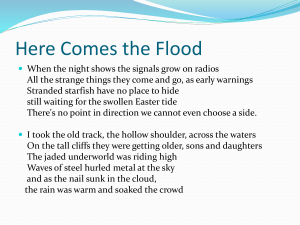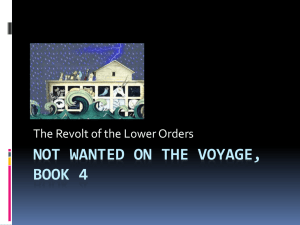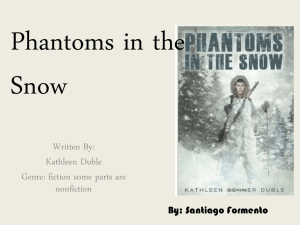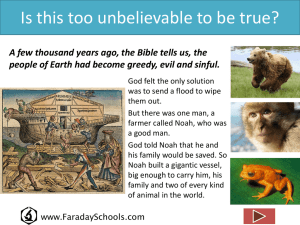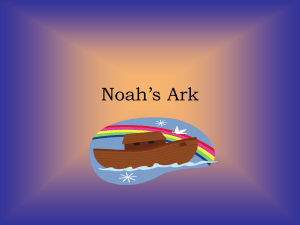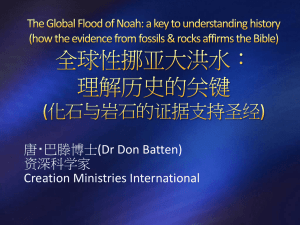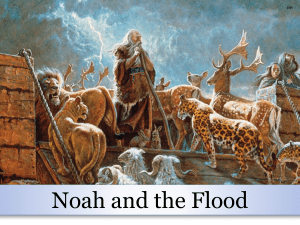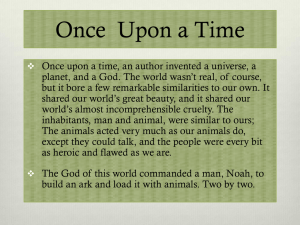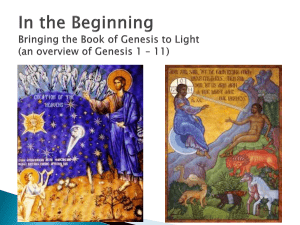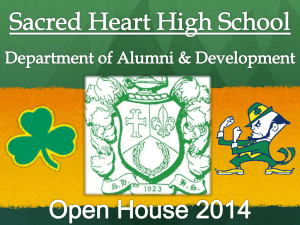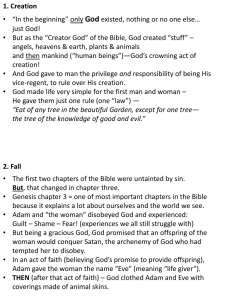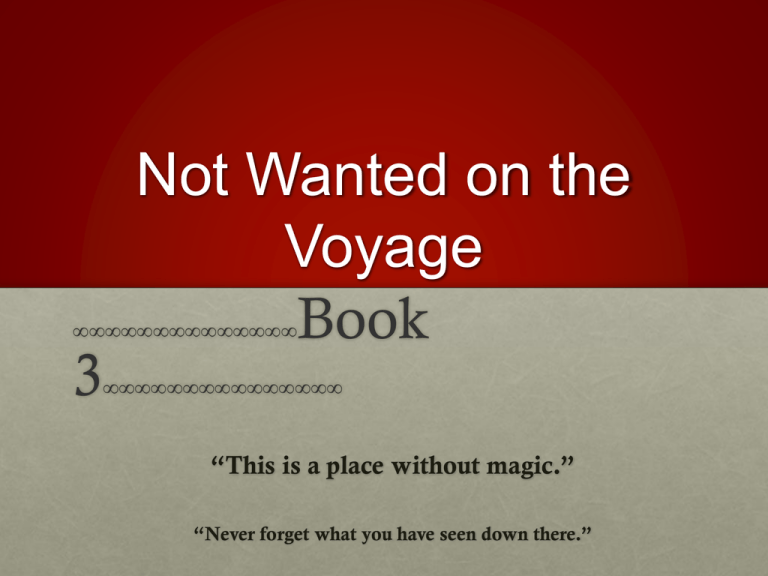
Not Wanted on the
Voyage
Book
∞∞∞∞∞∞∞∞∞∞∞∞∞∞
3
∞∞∞∞∞∞∞∞∞∞∞∞∞∞∞
“This is a place without magic.”
“Never forget what you have seen down there.”
ELABORATING ON NO
At the end of Book Two, the Ark said No.
By then, of course, Mrs. Noyes had already said no
herself. When she chooses not to board the ark, she says
no to the tyranny of the patriarchy, to Noah and Yahweh.
She renounces the old God as the old world slips away.
Looking at the animals for one last time, she recognizes
what the animals have known all along. When the rains
come, the animals gather in the trees: It was as if the
trees- and the trees alone- were salvation.
The trees - the apple trees- saved Mrs Noyes, and when
she does ultimately board the ark, she takes the apples
with her.
Women and Apples Redux
• We’ve been here before.
• Mrs. Noyes use of the apples recalls an earlier story
in which a woman deceived a man using apples. As
the story goes, Eve was another problematic woman
who refused to accept what was given her and
challenged the status quo. Her trespass against God’s
injunction brought about their expulsion from
Paradise and the suffering of humankind.
• Mrs. Noyes deception is to save life.
The Eternal Scapegoat
• The Patriarchy is always inclined to blame women:
• When Japeth’s wolves seem to be perishing of
thirst...
• When Apes spring from Man’s loins
• When Ham wishes to marry Lucy
• When Emma cannot be taken by her husband....
• If Hannah delivers an ape...
• There are no women in Yaweh’s retinue.
Mrs. Noyes’ Deception
• By the time Mrs. Noyes transgresses against the
orchard and deceives her husband to bring Mottyl
and Crowe aboard the ark, suffering and corruption
have already begun. THIS is a man-made holocaust,
a masculine assault upon the fertile earth.
• Her deception is to save the life of a blind pregnant
cat, to thank Crowe for reuniting them. There is no
higher, seditious purpose. It is a benign
transgression, surely, when compared to what we
have seen, and what we will see.
Living arrangements
• The four floors of the ark are contrived in such a way that
the upper and only open deck is reserved for those
“wanted” on the voyage.
• Here Noah establishes his armoury, his pagoda, and the
chapel.
• The lower decks open onto a well (not a sustainer of life,
as one thinks of a well) of darkness, a labyrinth of fetid
passageways, darkness and terror.
• The animals that are feared are kept the furthest distance
from the top deck, for both practical and symbolic
reasons.
Living arrangements
• Noah delegates the unpleasant tasks to others,
reserving the lighter tasks for those who have
displayed loyalty and the most laborious for those
who have proven to be problematic.
• The family is corralled to hear noah’s Edict, given in
Yaweh’s robes and with his two cats in his lap.
“Four and Four Make Eight” echoes Yaweh’s two by
two logic.
• “He was drawing a line between them- right down
the centre of the table: we and thee, he was saying, us
and them.”
So Let it Be Written
• Noah codifies the division of his family by writing it
down. Once written, it has the force of law. Written
pronouncements, accessible only to those who can
read, serve handily to divide the world, as education
and ignorance always divide the world. The enemies
of the patriarchy are to literally be kept in the dark,
no different from the other animals.
• Self-aggrandizement, separation, exclusion,
demotion-all without explanation. One is not given
because one is not warranted or deserved.
The most Reverend Doctor
noyes
• “only proper for one on his way to becoming a god”
• The us and them division is a simple metaphor for global
politics, but also functions in terms of biblical and
familial politics.
• “They sat at the table, ranged down either side like
factions at a treaty conference”
• Hannah reads “The Agenda” and instructs others to
“refer to the chart”
• Here the demolition and reformation of the family is
regarded in the benign terms of a corporate takeover.
The New World
• “I am in charge here. You, Madam, are not.
You are nothing, now, but a fellow passenger,
without station and without rank.”
Heads and Hearts
• Noah is the head, and the power relations are from the
top down.
• Head does not merely signify Noah’s position as
traditional leader of the family, captain of the ark,
director of operations, god in the dead Yaweh’s place;
• it also signifies the seat of the intellect, the rational
faculty traditionally privileged by and thought to be the
domain of men only.
• As such, the head is opposed to the heart, traditionally
devalued by men and regarded as subversive of a rational,
masculine system. The heart is dangerous; it is weak; it
cannot be trusted, and so is locked below.
Kindness is Criminal
• For example, Noah thinks that he will have to put
the stores under lock and key because of Mrs. Noyes’
“innate susceptibility to act of kindness... (he gave the
word a kind of twist, with his lips extended- as if he
were lapsing into a foreign language) “...kindness is
wasteful at the best of times, but in times like theseit is criminal.”
• As such, Findley makes clear that compassion is criminal,
and that those who may be susceptible to it are not to see
the light of day and, themselves, be kept under a system
of locks and keys.
The Castle, Chapel, and
the Armoury
• Noah’s throne, as indicated by his Edict, is the upper
deck, where we find traditional sites of power and
containment: the Castle, Chapel, and Armoury.
• These are the physical fortresses of Church and
State, out of which the ruling class has traditionally
operated, not just through force but through
rhetorical texts; traditionally masculine bastions.
• Noah makes clear that kindness is a crime, that
people like Emma, whose sister was an ape, are
dismissable.
Stating the Facts
• Words such as duty, reverence, and obedience are
held up as the greatest virtues, and it is this rhetoric
that is used to justify the division of the family.
• “I have my duties, Madam. I must commune with
god and you must listen and obey. Since Yaweh has
charged me with the safety of all this ark and all who
sail on her, it would seem to be elementary that my
dialogue should be with Him.”
• “I merely state the facts.”
A World in Miniature?
• The world of the ark looks, not surprisingly, a lot like our
own.
• Politics demand that countries have armaments even
though they may not have adequate food, housing,
educational opportunities, or fresh drinking water.
• It is a world in which pirates must occasionally be
invented in order to justify the presence of the military
construct and squandering of useful resources in that
realm.
• Like the slaughter of the pirates, our own slaughter of the
whales, seals, and dolphins suggest that our own terms of
reverence may not exactly be “life first.”
Japeth
• Japeth represents the military arm- the hunter and
warrior dimension- of the patriarchal construct, a
dimension that is tied to Japeth’s desire to be a man,
given his inability to convince his wife to accept him or
claim his wife by force.
• Japeth is inarticulate, totally incapable of words except
War! when faced with the pirates, perhaps because “his
mouth was full of knives, his hands full of buckles and
swords and the floor around him heaped with fallen
weaponry. For Japeth, his militaristic impulses merge
with his sexual ones, both of which serve principally to
prove his manhood to his father.
The Greater Threat
• “He had already seen the seeds of ruin sprouting; in his wife, in
Ham and Lucy...already at work in the bowels of the arkspreading opposition to the Edict- drawing the lines between
the will of Yaweh and the mere will of men.
• But they would not be allowed to prevail. Noah had sworn it.
All he need do was maintain his pwer amongst the others.
• This time, success. This time, mastery by whatever means. This
time, the will of God would triumph, no matter what the cost.”
• Furthermore, Noah suspects that he has been abandoned by
Yaweh, and that perhaps, in acknowledging Japeth’s twin, that
he (Noah) might not be of God at all.
The Seven Deadly sins
• Sloth
• Envy
• Lust
• Greed
• Gluttony
• Pride
• Wrath
Emma
• The rape of Emma represents, for many readers, the darkest of
Findley’s apocalyptic visions. It is the scene that lingers, though
not the only one.
• It represents the patriarchy taken to its height of depravity, and
it is suggested that this depravity springs directly from the
unaccountability- the unquestioned authority- of those in
power. It suggests that the slaughter of dolphins and the
pillaging of the world’s resources and the rape of children are
merely different faces of the same crime.
• When you see people as cargo, when you see them as problems
to be solved, when you see them as having no value whatsoever,
when you dismiss a woman’s autonomy over her own womb
and make it subject to the dictates of politicians, mostly men,
and all who invoke a greater cause in the name of a higher
power, any atrocity becomes possible.
The Unicorn
• That the rape of Emma and the death of the unicorn
constitute a single act is not surprising; both suggest
the violation of innocence and the death of magic.
• Noah, of course, blames Japeth, and Mrs. Noyes,
and Emma’s mother. They should have dealt with this.
But instead it has fallen upon Noah. In the
aftermath, he realizes that a justification will be
necessary.
The Unicorn
• Noah spoke to Japeth in a monotone- his voice the
very sound of reason- and he pacified his son by
saying: “We have solved all your problems...it was
not your fault before, but hers. This was
necessary...”He gestured at the Unicorn... “Your
own mother should have seen to this...” Here, Noah
took that always wild and unpredictable turn that
was meant to save him from any kind of blame: that
turning that convinced even himself that he was
blameless and- more than blameless- that he and he
alone was saving the entire situation by salvaging
everyone and everything from certain ruin....
Aftermath
• Japeth has little choice but to strike out at the unicorn.
He cannot strike his father or his wife, but needs to react.
The unicorn, already dazed and bleeding, is the only
choice, so he severs the unicorn’s horn- the phallus that
has taken what is rightfully his. This act further
demonstrates Japeth’s impotence and the fusion of sex
and violence that drives him.
• “To Noah, this was no more than a reasonable reaction.
Every man must exact his vengeance how and where he
sees it. It is only the act of vengeance that matters, since
it delineates the man. Later, Japeth would come to
understand that he had acted as the arm of god. Noah
would explain this for him.”
Holy dust. Holy beast. Holy
life.
• “ A holy purpose must be manufactured for its
death.”
• Holy dust. Holy beast. Holy life.
• “He would pray the formal prayer of mourning for
the Unicorn itself- for the Unicorn was the last of its
kind- deploring its irrevocable loss at the hands of
the untamed beast...
• Japeth, the ape. And Emma.”
• Holy meant: No Way Out.
Not Wanted on the Voyage
• While much of Book Three recounts life on the Upper
Deck, Findley is equally concerned with the life below
decks, and fills this part of the novel with a series of
memorable scenes.
• Particularly potent are those scenes where the 2 worlds of
the ark are juxtaposed, often violently.
• Consider those traits that are devalued and trivialized in
Noah’s world, but valued and celebrated below decks.
• What is Findley suggesting through this stark contrast in
worlds, and what are the implications for us?
Hearts in Darkness
• Juxtapose Noah’s violation of Emma with One Tusk’s careful probing of
the fallen Mottyl. The intent is to learn something, not hurt something.
• “Mottyl felt again the soft explorations of the elephant’s probe- felt herself
being taken very gently and held, just as she might have been held in the
crook of a large elbow- the way Mrs. Noyes sometimes held her. And then
she was lifted.....”
• All of this is done with care and attention, with explanations and the
important question: do you understand. Again, contrast this to Emma’s
experience on the upper deck.
• “We are all in this together- and we must do what we can do.”
• “In the end, it was practicality that won out...She sat on the floor of the
bear cage, and held the terrified bear until it fell asleep with its head in her
lap.”
Being saved
• “The wood- though half the animals gathered on the ark had made
their living there- had no such potential for danger as this place
had. And yet- Mrs Noyes felt safer here. Though sadder than she
might have been in the wood. Safer and sadder... We are truly
captives here, she thought; everyone of us- and yet, they have called
this: being saved.
• Maybe that was what she had meant by safety and sadness: that she
and all these creatures with her shared their captivity in a way they
had never shared the wood. When you are caught together in the
same trap, you share the same....enemy. you fear the same jailer.
You share the same dream of freedom- waiting, all together, for the
same door to open. You also learn to survive together in ways the
uncaged world would never think of....
• What is this cruelty then...that battens those doors up there and
locks us in, as if we were dragons, and fearsome.”
Fear in Disguise
• “The thought of Noah’s rages and Japeth armed gave her
the answer.
Cruelty was fear in disguise and nothing more. And hadn’t
one of Japeth’s holy strangers said that fear itself was
nothing more than a failure of the imagination.”
Mrs. Noyes and those below decks articulate a belief
unlike that of Noah and the patriarchy for which he
stands. which chooses not to empathize with the
conditions, feelings or opinions of anything other than
itself.
• h
Emma
• Emma keeps alive her memories of the past, and wears
the sign, the shawl made for her by her mother, of her
connectedness with life and the living past. She also
sustains a dream of freedom, the signs of which, feathers,
she wears in her apron.
• Emma had half clambered out of the tub... “My feathers...”she
said. All the feathers so patiently collected during her bird
feeding duties- the feathers with which, in daydreams, Emma
manufactured wings. Wings for Mrs. Noyes. Wings for Ham
and Lucy. Wings for mottyl and for the Unicorn- so that one
day they could all take off and fly away with Crowe and leave
the ark forever.
Emma
• When it is explained to Emma that her mutilation
has been for the sake of of making her sexually
available to her husband, Emma asks outright how
her injury can possibly have changed Japeth as much
as her. “Nobody sliced him up!” and when she
asserts that Japeth could not gain entry because she
wouldn’t let him, she asserts that she is the one with
power in their marriage, and rejects Noah’s
implications of her inadequacy.
Hannah
• “She was full of words. Sentences and paragraphs.
Whispers and shouts. Hundreds of them. Thousands.
But she was a woman and she could not speak. But
only think in silence and go mad.
• She desperately needed- and wanted- someone to talk
to, especially a woman; but she could not bring herself
to do it. All her pride was shuttered in silence; all her
ambition was locked in the choice she had made to sit
on the right hand of power... She wanted to admit she
was afraid; she wanted to tell about the loneliness: she
wanted to say out loud;I am in pain.She wanted to tell
about the child she was afraid had died inside her.
Lucifer: Bringer of Light
• While Noah rations goods, Lucy produces “wonders”
• linked to the morning star; the light Ham saw was Lucy
falling to earth. She produces candles and lanterns,
standing in opposition to darkness.
• “Lucy’s greatest fascination seemed to be with the
outcasts and the pariahs, the strangely formed and
excessively delicate: the Gryphons and the Glassmice, the
Demons and the Unicorns; the Cobras and the Platypi.
Her favourite birds were the immensely ugly Dodos and
the immensely unpopular Cuckoos.”
Lucy
• “Surely, above all, it was wonderful that Lucy was one of them,
in the bowels of the ark- that she was opposed to Dr. Noyesopposed to his experiments- opposed to his Edict- opposed to
his methods and his tactics and his...evil ways.”
• Noah, and the system he represents, will not be their saviours.
But Lucy might be. She came to earth in search of a place that
tolerated difference and opposition, and instead found another
tyranny. So she came aboard the ark, and even if it takes forever
(and the infinity sign suggests it will), Lucy will be one of
them.
• She spreads the word of another world offering the hope of a
promised land, a heaven where difference is respected.
Another manger scene
• We’ve been here before, too.
• The Biblical manger scene is rich in hope and promise.
• Forgiveness of our sins, eternal life after death. Magic.
• Findley closes Book 3 with another magical manger
scene, this one in the very bowels of the ark.
• Here, Lucy is briefly able to perform magic in this
world where there is no magic, and where even Lucy’s
abilities are failing. “The ground is not holy here... my
fingers have lost their power.”
Another Manger Scene
• Lucy Mrs. Noyes of other deaths. Adam and Lotte who were
once held in Mrs. Noyes’ hands, but also in unholy places.
Mortality is the way of this world, and nothing lives forever.
• This does not mean, though, that the unicorn should die in
vain. Lucy speaks of the value of the moment, the value of
shared memory, that the Unicorn lives as long as his life is
remembered. Of course, his death must be remembered, too.
Memory is the enemy of those in power who would use their
authority to scrub history clean of their bloody deeds.
• When boarding the ark, Mrs. Noyes is told she may bring no
souvenirs. There must be no reminders of the past that could
threaten the dominant narrative Noah intends to write.
Another World
• “Where I was born, the trees were always in the sun. And
I left that place because it was intolerant of rain. Now, we
are here in a place where there are no trees and only rain.
And I intend to leave this place- because it is intolerant of
light. Somewhere-there must be somewhere were
darkness and light are reconciled. so I am starting a
rumour, here and now, of yet another world. I don’t know
when it will present itself- and I don’t know where it will
be. But as with all those other worlds now past- when it is
ready, I intend to go there.”
• “Even if it takes a thousand years- we want to come with
you. Wherever you may be going.”
∞∞∞∞∞∞∞∞∞∞∞∞∞∞∞∞∞∞∞∞∞∞∞∞∞∞∞∞∞∞∞∞∞∞∞∞∞

